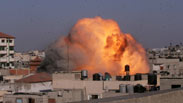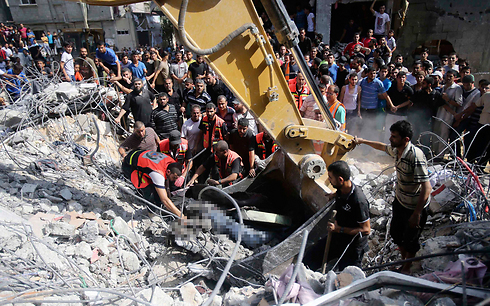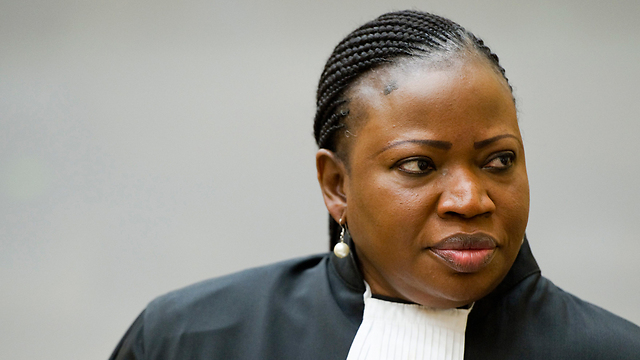
'War crimes in Palestine': Who will investigate, and what?
The ICC decision to launch an initial inquiry into claims of war crimes during last summer's fighting in Gaza does not mean there will be an investigation, the experts say.
What are the implications of the decision by the International Criminal Court at The Hague to launch a preliminary investigation into the possibility of "war crimes in Palestine", following Operation Protective Edge, and how should Israel respond?
Legal experts say this is the start of a very long process, which includes gathering documents and testimonies, and even if an international investigation is launched – it is a long way off.
Nonetheless, says Colonel (ret.) Pnina Sharvit Baruch, a senior researcher at the Institute for National Security Studies and former head of Israel Defense Forces international law division, that precisely now it is worthwhile for the Military Advocate General to investigate, for example, the events of "Black Friday" in Rafah.
Related articles:
- ICC launches initial inquiry into potential war crimes in Palestinian territories
- Does Abbas really want to take Israel to The Hague over Gaza?
- Palestinians recognize ICC jurisdiction for Gaza war, but exclude events leading up to it
"When the state itself examines allegations of war crimes and performs a comprehensive professional examination, it prevents the International Criminal Court from investigating the allegations itself," she explains.
"All the allegations against Judge Advocate General and the calls not to examine events and not to investigate soldiers, come from people who do not understand the significance of non-investigation. Actually such examinations avoid interference from outside sources, so the examinations should be as professional, comprehensive and transparent as possible."

Baruch's comments are based on the fact that one of the criteria for filing a claim against a state at The Hague is the inability to investigate suspicions. If judicial institutions do so thoroughly, there is no justification for the involvement of the ICC and its chief prosecutor Fatou Bensouda. Another level on which Israel intends to operate is to present "an arsenal of evidence" in order to bring charges against the Palestinians and prove that they are the ones who committed war crimes.
Bensouda, elected in November 2012, is overseeing several some preliminary examinations of war crimes charges in Afghanistan, Colombia, Georgia, Guinea, Honduras, Iraq, Nigeria and Ukraine. In the case of Ukraine, for example, the Kiev government announced in April 2014 that it recognized the authority of the ICC to investigate war crimes allegedly committed by the government of ousted pro-Russian president Viktor Yanukovych. Eight months have passed since Ukraine turned to The Hague, and a formal investigation has not yet begun.
A long and winding road
Sharvit Baruch noted that the initial investigation by the ICC mainly includes collecting materials and documents, a process that can last for many years.
"They'll read reports, collect available documents and read all the material provided by the two sides, Israeli and Palestinian. Only if they decide that there is reasonable suspicion (of war crimes) will there be an investigation, a process led by prosecutors and investigating judges, who could even issue warrants and bring charges against politicians and military personnel."
Dr. Sigall Horovitz former legal advisor at the UN tribunals for Rwanda and Sierra Leone, and researcher at the University of Haifa and the Hebrew University, explains.
"We are in the very preliminary stage, which should examine if the four rules have been met that allow the court to start investigating," she says. "You have to ensure that alleged violations are included in the Rome Statute, examine the level of severity of the offenses ostensibly attributed to Israel, check that there are no claims of abuse of process, and there is another material condition - the 'complementarity condition' - which means that the court will not launch a criminal investigation as long as there is a state investigation (by the Israeli authorities, for example) into the same offenses."
Horovitz says that Israel was at the same point after the Mavi Marmara raid, but finally decided to cancel the preliminary inquiry, as the offenses did not reach the levels required to begin criminal proceedings.
"After the initial assessment, the Court may decide on a criminal investigation, at the end of which criminal detention orders could be served against the country's leaders."
Horovitz notes that the inspection process could take many years, as in the case of Georgia, which seen an eight-year investigation, and Sudan, whose refusal to cooperate with the ICC led to the inquiry being put on hold after the investigation reached a dead end.
The road to investigation
Prof. Robbie Sabel of the Hebrew University Faculty of Law explains that the first stage is to determine whether if there is any authority to open an investigation against Israel, a decision made primarily by examining documents. Only afterwards will it examine if there is a basis for suspected war crimes, and if the answer is positive, then is the decision taken whether to investigate.
The question of jurisdiction is examined through a series of questions:
- Is the state in whose territory the crimes allegedly occurred a member of the court? (Israel is not a member of the ICC.)
- Did the alleged offense take place on its territory?
- Is this an accusation of a serious war crime, or a crime against humanity?
- Has the state itself investigated the issue in bad faith?
In addition to considering whether it would serve justice, the court must also consider whether the investigation could harm a national reconciliation program or the peace process. In this case, the court cannot act even if does have the authority to do so.

Sabel explains: "The court needs to investigate the other side, too. This is something that the Palestinians really do not want, nor would the Court want to do so. Therefore, there is a strong possibility that they will press on with the initial inquiry and give up on the actual investigation. The Palestinians, for example, have avoided submitting a formal complaint against Israel until now because of this issue".
On the agenda
According to Sabel, if the Court decides that it does have powers to investigate Israel, it can explore several issues, including whether the fighting in Gaza was a violation of the law of war, and if the West Bank settlements are a violation of international law, given that the Geneva Convention prohibits the transfer of a civilian population into occupied territory?
An exploration of the legality of the settlements could be more comfortable for Palestinians - and for Western countries, which are not enthusiastic about an investigation into the IDF.
"It would not lead them into a confrontation with the West; there is no barrier such as an investigation conducted by the state, as Israel has clearly not investigated the settlers or those who sent them there," says Sabel.
But he qualifies: "On the other hand, it is not certain that a court set up to investigate war crimes on the scale of genocides would want to consider the question of whether Ramat Eshkol (a Jewish neighborhood in East Jerusalem) is today considered occupied territory, and where the borders are. It is such a political issue that there is a high probability that the court will determine it is none of its business."
Possible subjects
If an investigation is opened, the ICC can summon any witness it sees fit – from senior officers (such as IDF Chief of Staff Benny Gantz) to ministers (Defense Minister Moshe Ya'alon, for example) and heads of state, as well as other officials and laymen. Nonetheless, this is a complex issue, and only if and when the decision is made to investigate will the court convene a special panel of judges to decide which factors will be investigated.
In the decade that the ICC has been in existence, it has only convicted three people, and all of its examinations have been conducted against African countries. At the moment, court officials are investigating Muammar Gadhafi's son, another member of a non-Western state.
There are those who fear that with Israel, the Court will actually want to show it can hold an inquiry into a Western country, Sabel says. "At the very least, they are committed to the preliminary examination, in part because what happens in Israel interests the whole world."











